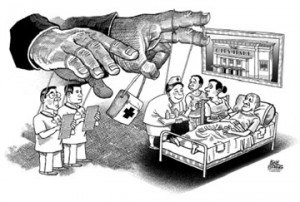Quality health care

The Duke of Edinburgh’s observation was a stark reminder of this reality amid the Cebu City government’s Charter Day recognition of the Cebu City Medical Center (CCMC) as one of its outstanding agencies.
The P100,000 cash gifts, half of which was given to acting CCMC chief Dr. Gloria Duterte, will be used to buy air-conditioning units and pay for other improvements in the hospital that former mayor and now Congressman Tomas Osmeña once considered selling to the highest bidder like, say, magnate Manny Pangilinan.
The city-run hospital remains the refuge of low-income families, who don’t have health insurance.
Filipino nurses are among the best workers who have found a niche in Great Britain, the US and Europe. They join laborers in the Middle East and other parts around the world who send hard-earned money back home to their families, who in turn spend it in the local economy or invest in small businesses.
The exodus of nurses underscores a longstanding failure of the government to stabilize the economy enough to provide jobs and wage levels to keep nurses from seeking more gainful employment abroad. The problem won’t go away anytime soon, but steps can be taken to entice them back home.
Article continues after this advertisementWhile we continue to hold the President to his promise that someday during his term more Filipinos will return to find jobs at home, this prospect may come true for an entirely different reason which is the downsizing of imported labor by First World countries.
Article continues after this advertisementPinoy nurses comprise a mere two percent of the nursing labor force in Great Britain, but they have established a solid presence and their performance as evidenced by Prince Philip’s remarks meant that demand for their skills is strong.
But that demand won’t last forever, as is the case with countries like the US whose nationals are clamoring for companies to employ more local labor and keep investments at home despite tax incentives being offered by countries like China.
In fact, the Philippines is hard pressed to compete with India and Singapore due to abundant cheap labor there, and with China, which has better infrastructure and tax incentive schemes.
Which is why stories like CCMC, which continue to plod on despite inadequate staff and facilties, give us reason to hope that steps are being taken by the local government to provide Filipinos with quality health care administered by fellow Pinoy medical personnel.
While Osmeña promises world-class health centers in his pet project South Road Properties (SRP), we can only hope that the same quality health care can be availed of by Cebuanos who aren’t as well off.